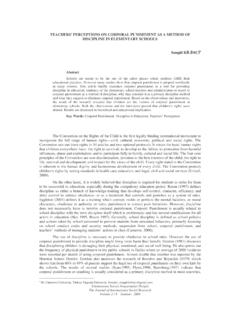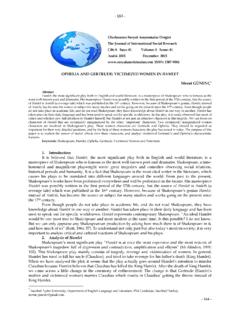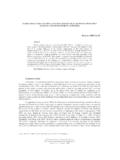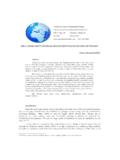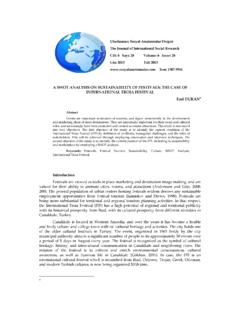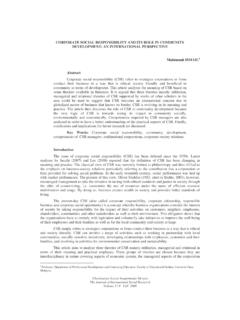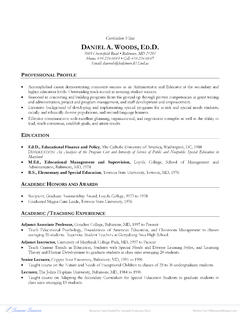Transcription of Adesoji and Olatunbosun - sosyalarastirmalar.com
1 STUDENT, teacher AND SCHOOL ENVIRONMENT FACTORS AS DETERMINANTS OF achievement IN SENIOR SECONDARY SCHOOL CHEMISTRY IN OYO STATE, NIGERIA Dr. Francis A. Adesoji Dr. Segun M. Olatunbosun Abstarct The study constructed and tested an eight-variable model for providing a causal explanation of achievement of secondary school students in chemistry in terms of student variables - attitude to learning chemistry, background knowledge in Integrated Science, teacher variables - attitude to chemistry teaching, attendance at chemistry workshop and school environment related variables-class size, laboratory adequacy and school location.
2 The study adopted an ex-post facto research type the population was made up of 621 senior secondary III chemistry students and 27 Senior Secondary III chemistry teachers in Oyo State, Nigeria. Four sets of instruments were used, these were chemistry achievement Tests (SACS), teacher . Attitude Towards Chemistry Teaching Scale (TATCTS) and Laboratory Adequacy Inventory (LAI). The results revealed that of the total effect on achievement in chemistry was accounted for by all the seven predictor variables when taken together.
3 It was also revealed that only four variables -school location(X1) laboratory adequacy (X3), teachers attitude to chemistry teaching(X5) and teachers attendance at chemistry workshop(X4) had direct causal influence and also made significant contributions to the prediction of achievement in chemistry (X8) (the criterion variable). Recommendations based on the significance of these variables were then highlighted. Key Words: student, teacher , school, determination achievement , environment factors.
4 Depatment of teacher Education, Univetsity of Ibadan, Nigeria. e-mail: Depatment of teacher Education, Univetsity of Ibadan, Nigeria. Uluslararas Sosyal Ara t rmalar Dergisi The Journal Of International Social Research Volume 1/2 Winter 2008 14 Adesoji , Francis A. Olatunbosun , Segun INTRODUCTION The enviable position which science education system of most countries of the world, including Nigeria is perhaps justifiable.
5 The reason is that science can exert a dominant, if not decisive influence on the life of individual as well as on the developmental effort of a nation (Emovon, 1985). The universal recognition of the above submission is responsible for the prime position that has been accorded science and in particular, chemistry worldwide. Within the context of science education, chemistry has been identified as a very important school subject and its importance in scientific and technological development of any nation has been widely reported.
6 It was as a result of the recognition given to chemistry in the development of the individual and the nation that is made a core - subject among the natural sciences and other science- related courses in the Nigerian education system. Its inclusion as a core subject in science in the secondary school calls for the need to teach it effectively. This is because effective science teaching can lead to the attainment of scientific and technological greatness. Chemistry teaching can only be result-oriented when students are willing and the teachers are favourably disposed, suing the appropriate methods and resources in teaching the students.
7 With the current increase in scientific knowledge the world over, much demand is placed, and emphasis is laid on the teacher , the learner, the curriculum and the environment in the whole process of teaching and learning of science. Despite the importance of chemistry to mankind and the efforts of researchers to improve on its teaching and learning, the achievement of students in the subject remains low in Nigeria. Among the factors that have been identified outcomes in chemistry are, poor methods of instruction (Osuafor, 1999) teacher s attitude (Aghadiuno, 1992), laboratory in-adequacy (Okegbile, 1996; Raimi, 1998; Bajah, 1999 and Adeyegbe, 2005), and poor science background (Oshokoya, 1998 and Adesoji , 1999).
8 Papanastasiou (2001) reported that those who have positive attitude toward science tend to perform either in the subject. The affective behaviours on the classroom and strongly related to achievement , and science attitudes are learned (George and Kaplan, 1998), the teachers play a significant role during the learning process and they can directly or indirectly influence the student s attitudes toward science which in consequence can influence students achievement . Teachers are, invariably, role models whose behaviours are easily mimicked by students.
9 What teachers like or dislike, appreciate and how they feel about their learning or studies could have a significant effect on their students. By extension, how teachers teach, how they behave and how they interact with students can be more paramount than what they teach. Student s attitude toward the learning of chemistry is a factor that has long attracted attention of researchers. Ojo (1989) and Adesokan (2002) asserted that Student, teacher And School Environment Factors As Determinants Of achievement In Senior Secondary School Chemistry Uluslararas Sosyal Ara t rmalar Dergisi The Journal Of International Social Research Volume 1/2 Winter 2008 15 inspite of realization of the recognition given to chemistry among the science subjects.
10 It is evident that students still show negative attitude towards the subject, thereby leading to poor performance and low enrolment. The achievement of students in chemistry is also reported to be causally influenced by the previous experience of the students in integrated science. A student cannot learn chemistry effectively without giving through some experiences in integrated science (Oshokoya, 1998 and Adesoji , 1999). Other factors that may have causal relationships with students academic achievement is science, particularly, chemistry include teacher attendance at chemistry workshop, laboratory adequacy, class size and school location.
